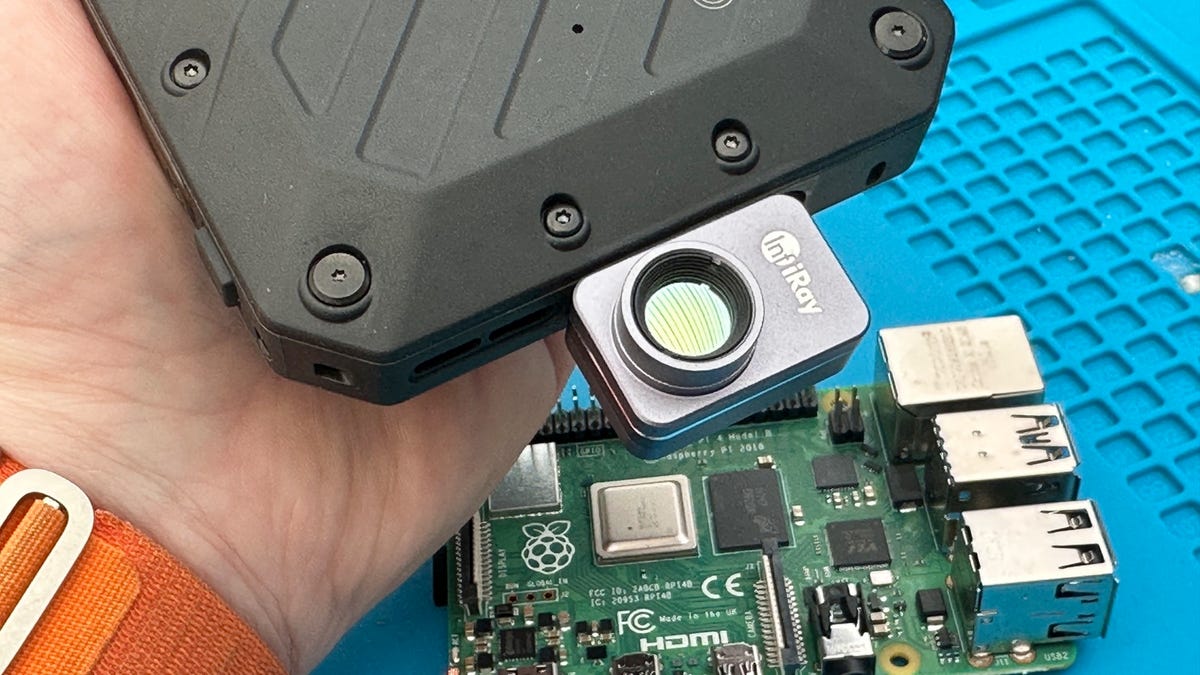- I recommend the Pixel 9 to most people looking to upgrade - especially while it's $250 off
- Google's viral research assistant just got its own app - here's how it can help you
- Sony will give you a free 55-inch 4K TV right now - but this is the last day to qualify
- I've used virtually every Linux distro, but this one has a fresh perspective
- I replaced my JBL speaker with this surprise alternative. Here's why it's my new top pick
This tiny accessory gave my Android phone thermal vision superpowers. Here's how to use it

I’m a big fan of Android smartphones with built-in thermal cameras, such as the awesome Ulefone Power Armor 18T.
I also understand that some people just don’t want to have to swap out their smartphones to get access to this useful superpower.
Also: How I use this Android phone with thermal vision superpowers (and why you need it)
If you don’t want to have to buy a new smartphone, then this is the tool for you, and right now you can get it for $80 off if you’re a Prime member: InfiRay P2 Pro.
InfiRay P2 Pro tech specs
- 256×192 IR resolution
- 256×192 IR resolution
- -20°C to 550°C ± 2°C temperature range
- Small design: 27mm × 18mm × 9.8mm and weighs 9g
- Battery-free design
- Support Android 9.0 and above
- USB-C interface
The InfiRay P2 Pro consists of a tiny thermal camera and a magnetic snap-on macro lens that allows the camera to be brought super close to the item being examined.
Also: This 12-in-1 electric screwdriver is my go-to tool, and it’s available for less than $50
The camera is indeed tiny. Measuring 27 × 18 × 9.8mm and weighing in at a minute 9 grams, it’s smaller and lighter than a charging cable.
The InfiRay P2 Pro is tiny.
Adrian Kingsley-Hughes/ZDNET
Setting up the P2 Pro is easy — download and install the P2 Pro app from the Google Play Store, fire up the app, pop the camera into the USB-C port, and away you go.
Here is the InfiRay P2 Pro fitted onto an Android smartphone.
Adrian Kingsley-Hughes/ZDNET
If your Android smartphone is the ruggedized type, you might have problems fitting the camera and need to get your hands on a USB-C extender.
Also: The best travel gadgets of 2024
Then you can start exploring your environment.
Here’s an InfiRay P2 Pro selfie.
Adrian Kingsley-Hughes/ZDNET
A feature of the P2 Pro app I really like is that along with crosshairs at the center of the image are two more that pick up the highest and lowest temperature in the shot.
The P2 Pro app gives you a raft of thermal information.
Adrian Kingsley-Hughes/ZDNET
Then there is the macro lens.
Here’s the magnetic macro lens for the P2 Pro.
Adrian Kingsley-Hughes/ZDNET
Popping the macro lens onto the front of the camera lets you get up close and personal with what you’re looking at, giving you better resolving power to really home in.
Let’s get up close with the macro lens.
Adrian Kingsley-Hughes/ZDNET
Here’s a closeup thermal image.
Adrian Kingsley-Hughes/ZDNET
The software offers a lot of customization options without being packed with unnecessary features.
The P2 Pro software is well thought out.
Adrian Kingsley-Hughes/ZDNET
This thermal camera is awesome, especially considering the price.
Not sure what you can do with one? Here are just a few things you can do with a thermal camera:
- Find overheating electrical components (faulty components usually run hotter).
- Diagnose all sorts of HVAC problems, from windows that leak heat to radiators that aren’t warming up properly to AC units that aren’t cooling.
- Find dangerously overheating rechargeable batteries.
- Find radiator pipes underneath floorboards.
- Find overheating power cables.
- Find problems with cooling systems on desktop and laptop systems.
- Spot binding brakes on cars.
My tip for learning to use a thermal camera is to use it to look at things when they aren’t faulty — your radiators, car brakes, electrical stuff, anything — and that way you get to know how things should look, so you can tell when things aren’t working right.
Also: Every gadget geek knows: There’s always a better tool
I find the thermal camera so useful that I turn to it without thinking about it. Just now, I wanted to know if an electrical appliance was getting power. Instead of reaching for a multimeter, I used my thermal camera to see if anything was warming up on the inside. Once I saw components heating up, that eliminated a load of possible problems.
I’ve been testing a number of thermal cameras — both cameras that are standalone and cameras that attach to smartphones — and the InfiRay P2 Pro is the best. It’s small, the macro lens makes it super flexible, it’s fast and accurate, and it doesn’t need to be charged up separately.
This is a fantastic addition to any repair toolkit, and if you’re an Amazon Prime member, you can get $80 off the list price of the iPhone version, while the Android version is currently discounted to $219.

